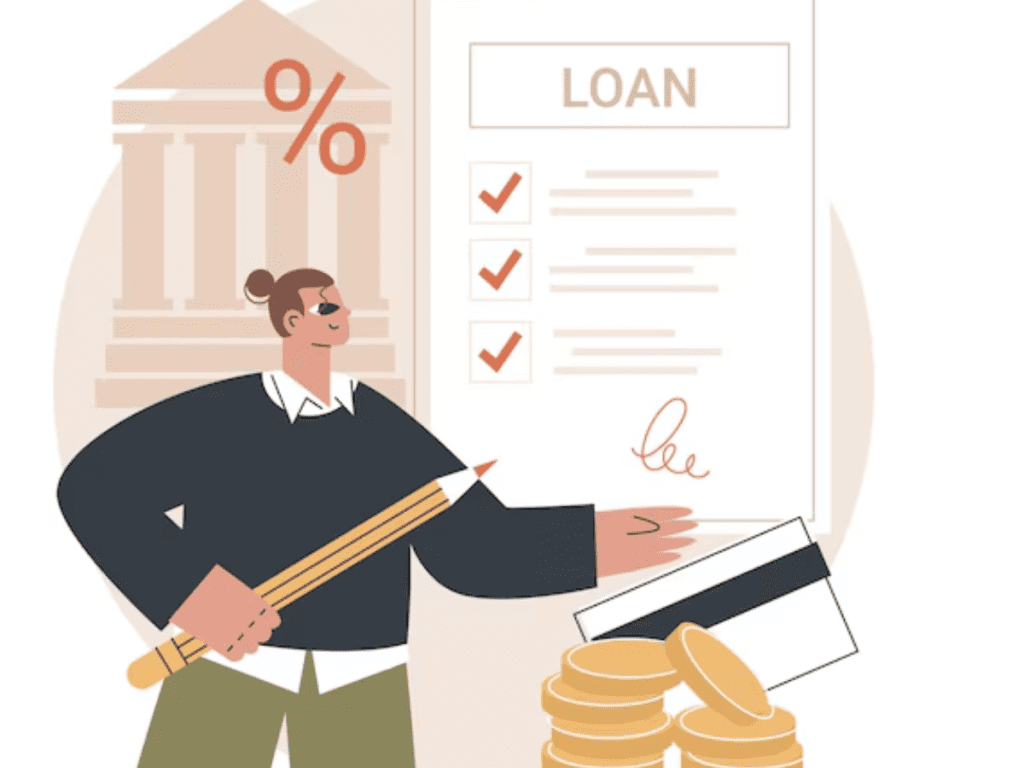Introduction
Emergencies always seem to arise at the most inconvenient time and are generally unpredictable, giving us barely any time to prepare. Whether you have a surprise medical emergency, a need to repair your home, or an imminent financial responsibility, the ability to access quick cash can be daunting. In those moments, an emergency personal loan can be the savior you need. These loans provide a rapid means of obtaining money, particularly if other methods, such as savings or borrowing from relatives and friends, are not an option. In this article, we will talk about all that you need to know about personal loans for emergencies, such as what they are, when to apply, how to apply, and how to manage them successfully. By the end of this guide, you will know how personal loans work in case of emergencies and how to make the correct financial decision under duress.
What is a Personal Loan for Emergencies?
An emergency personal loan is an unsecured loan that lets you borrow a specific amount of cash to help you meet unforeseen expenses. Unlike other loans, personal loans do not demand any collateral, which means that you are not asked to pledge any of your assets (e.g., house or car) in order to obtain the money.
Personal loans are generally provided with suitable repayment schedules and interest rates, and they can be disbursed within no time, which makes them the best option for emergency financial requirements. Personal loans are employed for any kind of emergency expenses, such as medical charges, renovation of a home, or any other unexpected financial liability that requires immediate action.
Important Features of Personal Loans for Emergencies
- Unsecured Loan: There is no requirement for collateral, and thus the loan becomes more convenient to obtain.
- Fast Disbursal: In most instances, personal loans can be disbursed between 24 and 48 hours, which is important in cases of emergencies.
- Flexible Usage: The loan is available for use for any reason, providing you with the convenience of taking care of your emergency as desired.
- Fixed Interest Rates: The majority of personal loans have fixed interest rates, so you get to know exactly how much you are paying each month.
- Varied Loan Amounts and Terms: You can generally borrow between a small amount and larger sums, based on the policies of the lender. Repayment periods tend to extend between one to five years.
When Should You Consider a Personal Loan for Emergencies?
While personal loans for emergencies provide instant access to cash, they must not be availed unnecessarily. It is always essential to review your finances and decide if this is the most suitable option for your specific requirement. Following are some typical scenarios where a personal loan can be an effective solution.
Medical Emergencies
Medical emergencies that involve illnesses, accidents, or surgeries unexpectedly result in costly expenses. Your medical bills might become more than you can afford if you haven’t prepared by saving. Fortunately, a personal loan can be a swift and sure bet to bail you out of a financial crisis when you’re not financially prepared to pay the bill. This is especially the case if the emergency treatment is not something you can delay.
Home Repairs or Renovations
Home emergency repairs can pop up unexpectedly. It could be a plumbing, electrical, or roof damage problem that needs to be repaired before further damage is done. When you don’t have enough savings to cover these unforeseen expenses, a personal loan can help pay for them so you can repair your home in a timely manner.
Emergency Travel Expenses
At times, you might be required to travel suddenly due to family issues, work-related issues, or other emergencies. A personal loan can be used to finance travel costs, such as flights, accommodations, and transport, when you have to respond quickly and your finances at the moment cannot accommodate such an unexpected expense.
Debt Consolidation
If you have several high-interest debts hanging over your head, rolling them into one personal loan can help. This condenses all of your outstanding balances into one loan with one rate of interest, often lower than that of a credit card or payday loan. This can be easier to pay back and also cut down on the hassle of making multiple payments.
Loss of Income or Unexpected Financial Setbacks
In event of sudden loss of employment, reduction in income or other monetary setbacks, a personal loan can fill the gap until your economic situation improves. It can pay for bills, daily expenses, and other financial obligations that are pressing, leaving you with some time to get back on your feet.
How to Get Quick Funds with a Personal Loan
If you have concluded that a personal emergency loan is the most suitable option for your case, the second step is to apply for the loan. The following are the most important steps to follow when applying for a personal loan:
Check Your Credit Score
Your credit score is very important in obtaining a personal loan. Your credit score is used by lenders to determine whether you will be able to repay the loan. With a better credit score, you will be offered a lower interest rate, but with a poor credit score, you might be charged higher rates or even your loan request may be rejected. It’s advisable to review your credit score before applying to make sure you are in a favorable position to get approved.
Calculate the Loan Amount and Repayment Period
Before you apply for the loan, take time to determine how much you need. This will help you avoid borrowing more than you should and paying more in interest. In addition to the amount of the loan, think about the repayment period. Although you might prefer a longer repayment period to lower your monthly payment, keep in mind that longer periods tend to cost you more in interest over the life of the loan.
Compare Lenders and Loan Offers
It is worthwhile to compare personal loans from various institutions. Rates, terms, and approval times vary widely between banks and other institutions. In comparing loans, take note of:
- Interest Rate: The lower the interest rate, the lower your monthly payments and the amount of interest paid throughout the loan’s life.
- Processing Fees: Many lenders charge a processing fee that adds to the overall cost of the loan.
- Time to Disburse Loan: During an emergency, the faster the loan is processed and the money is disbursed, the better. Opt for lenders that have fast processing times, particularly if you are in urgent need of the money.
- Repayment Period: Ensure the repayment period of the loan coincides with your budget and monthly economic condition.
Collect Documents Needed
There are some documents that the lenders will ask you to provide during the loan application process. These generally are:
- Identity Proof: A government ID like a passport, driving license, or Aadhar card.
- Address Proof: Utility bills, rent receipts, or bank statements.
- Income Proof: Salary slips, tax returns, or bank statements to confirm your repayment capacity.
- Bank Details: Details of your bank account for loan transfer.
Having these documents ready can speed up the application process and ensure that you do not face any unnecessary delays.
Apply Online for a Faster Process
Most lenders have online applications, which are quicker than in-person applications. You can complete your application and send documents fast online. Some online lenders also have automated processes that can approve a loan within minutes or hours. Applying online gets you faster access to funds during times of emergency.
Tips for Managing Personal Loans During Emergencies
While a personal loan can provide quick relief, it is essential to use it wisely and manage it effectively. Here are some tips for handling personal loans during emergencies:
Be Clear About Your Repayment Ability
Before you borrow, assess your finances to find out if you can afford to repay the loan. Although personal loans are created to be cheap, you must make sure you can afford to pay the monthly instalments without putting your finances too tight.
Borrow Only What You Need
It’s simple to want to borrow more than you require, particularly during a crisis. Yet, taking out more money than required will cause higher interest payments and extended periods of time for repayment. State the exact amount you need and do not borrow too much.
Search for Flexible Loan Terms
Certain lenders provide flexible repayment options for the loan, for example, allowing repayment prior to the schedule without penalty or the ability to change the repayment plan. Having flexibility can be advantageous if your finances change for the better before the loan period is over, as it helps pay less interest overall.
Avoid Missing Payments
Late loan payments can result in penalties and hurt your credit score. Be sure to arrange reminders or automatic payments so that you never miss a payment. This will save you from late fees and ensure a good credit history.
Be Aware of Hidden Fees
Always carefully read the terms and conditions prior to signing any loan contract. Prepayment penalties, processing fees, or late payment fees are some of the hidden charges that can be included in some loans. Make sure that you know all the possible expenses involved in the loan before making a decision.
Conclusion
Emergencies are inevitable in life, but they do not have to undermine your financial stability.
A emergency personal loan can help you access the quick money you require to handle unforeseen expenditures, from doctor’s bills to plumbing repairs. But it is important to lend responsibly and pick the proper lending option according to your financial resources and requirements. By taking the steps described in this guide, you can obtain the money you require, pay off your loan efficiently, and get back on your feet as quickly as possible. If you require fast cash for a medical emergency, repair work, or any other unforeseen circumstance, a personal loan can help inject the financial support you need to weather difficult moments. Be certain to carefully weigh your choices, compare offers, and know the conditions before you enter into a loan contract. If done in the proper way, you can utilize a personal loan as a vehicle to overcome emergencies without jeopardizing your finances.

